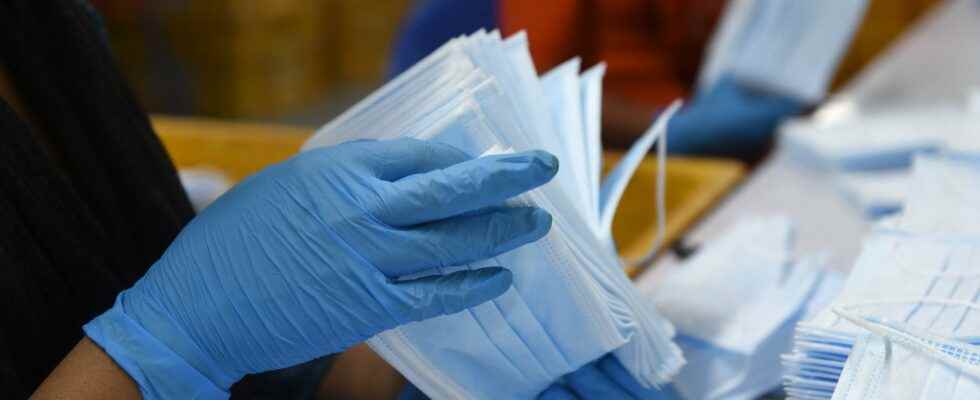Juliette Moreau Alvarez
modified to
5:10 p.m., October 02, 2022
It was a government commitment. On July 31, the Health Risk Monitoring and Anticipation Committee, or Covars, was created. Having replaced the Scientific Council, which provided a lot of support to the government during the Covid-19 crisis, this new cell aims to be transparent and independent. If the Scientific Council was inaugurated at the start of the Covid-19 epidemic specifically to reflect on the virus, the Covars was designed over the long term, beyond the coronavirus. A 2.0 committee of experts that the State hopes will be sustainable and adapted to all health crises of infectious origin.
It is a monitoring and anticipation committee
The Covars “exercises a role of independent expertise and advice with the aim of informing the decisions of the public authorities”, specified the government in a Press release. In simple terms, the last pandemic has highlighted the points to be improved in order to deal with large-scale health episodes. The Covars was therefore inaugurated in a spirit of prevention. The committee will work on the challenges of anticipating health crises and their consequences on the population.
This new cell can be seized by the Ministers of Health and Research but also has the ability to self-seize. Thus, the Covars will not only watch over infections but will also be an authority figure. It is he who will advise the government by giving a guideline on the gestures, the restrictions and the vaccination strategy to be adopted. Like the Scientific Council, all its opinions will be made public.
He works on all infectious risks, beyond Covid-19
Among the missions of Covars, the government lists scientific monitoring, prediction and modelling, recommendations to reduce risks, or even the care and support of citizens. Extensive work around future and current health crises. Thus, unlike the Scientific Committee, this unit will not be content to work on the Covid-19, but also on other infectious risks such as the Monkeypox epidemic, dengue or AIDS for example.
As the world is changing fast, we’re getting ahead of the game by launching with @sretailleau the Health Risk Watch and Anticipation Committee. A crucial new weapon to protect every pillar of our health against the crises of today and tomorrow. pic.twitter.com/ztq6ml8pvT
— Francois Braun (@FrcsBraun) September 29, 2022
“During any crises, it can be expanded to include the best expertise in view of the issues raised, and thus continue its role of adviser to the Government”, specifies the latter in its press release. The Covars therefore does not rule out welcoming exceptional members to adapt effectively to the situation it encounters.
An expanded list of missions compared to the Scientific Council
The Covars missions are part of the so-called “One Health”. This approach focuses mainly on infectious diseases that are transmitted from animals to humans and vice versa. An echo, moreover, of the current global pandemic of animal origin.
She also studies their emergence in connection with global changes and antimicrobial resistance. This way of thinking has made it possible to approach the pandemic linked to Covid-19 at different scales to find appropriate solutions. From now on and thanks to this approach, Covars wants to issue comprehensive opinions and adapt to all the crises and risks that it may identify.
Immunologist Brigitte Autran also notes that Covars’ missions are what differentiate the committee from its predecessor. In addition to the infectious risks, the Covars also looks at “the risks related to food and especially to climate change, pollution and the environment”. In short, it has wider research areas.
A diverse committee, but not equal
Among them, we find epidemiology researcher Simon Cauchemez, veterinarian Thierry Lefrançois, virologist Bruno Lina and infectiologist Denis Malvy, already members of the last Scientific Council. Similarly, former members of the Vaccine Strategy Guidance Council (Cosv), also dissolved, have been appointed, such as Dr. Mélanie Heard.
Congratulation to@YvanieCaillefor his appointment to the committee for monitoring and anticipating health risks! Yvanie, founder of @Renaloo will be a major contribution to COVARS, most of whose members she already knows. #ActionPatientshttps://t.co/QKVNNyT0SE
— The Seropotes (@seropotes) September 29, 2022
If the Covars brings together fourteen scientific personalities, there are also two patient representatives, Yvanie Caillé and Cécile Offerlé. Véronique Loyer was appointed as the citizens’ representative. “We have a real representation of what is called health democracy”, greeted President Brigitte Autran on franceinfo. Finally, the committee is integrating new members, including Annabel Desgrées du Loû, specialist in sexual and reproductive health, and Patrick Giraudoux, researcher in wildlife ecology and ecosystem health. Here again proof of the Covars’ desire to think on all fronts.
This “commando of very high-level scientists” is appointed for a period of two years, renewable once. The government has full confidence in the committee, which must now inform the decisions of the public authorities.
